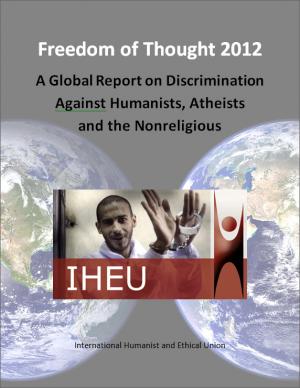Atheists, humanists, freethinkers and other non-religious people are discriminated against around the world, with expression of their views is often criminalized and subject in some countries to capital punishment, the International Humanist and Ethical Union (IHEU) told the United Nations, Monday.
In a document for consideration by the world body's Human Rights Council, IHEU demonstrates that atheism is explicitly or effectively outlawed in many states, where people are forced to adopt a religion, sometimes from a narrow range of offical options, or where leaving a religion, in particular Islam, is itself criminalised.
In detail: The legal basis of non-religious rights
The submission by IHEU, which represents more than 120 Humanist organisations in around 45 countries, in turn representing millions of individual humanists, said:
"The universal human right to freedom of thought, conscience and religion, as laid down in Article 18 of the Universal Declaration of Human Rights and subsequent treaties, protects the freedom of conscience of every human being. Just as freedom of religion or belief protects the right of the individual to follow a religion, it also protects the right to reject any religion or belief, to identify as humanist or non-religious, and to manifest non-religious convictions through expression, teaching and practice. Whilst this fundamental right includes the right not to reveal your beliefs or religious identification, and the right not to take part in religious ceremonies, it also includes the freedom to argue for those beliefs in public, and to seek to persuade others of the merits of your beliefs, or the flaws of theirs, through debate and criticism.
"The right to criticize religion is protected also by Article 19 of the Universal Declaration of Human Rights: “Everyone has the right to freedom of opinion and expression; this right includes freedom to hold opinions without interference and to seek, receive and impart information and ideas through any media and regardless of frontiers.” Atheist speech is therefore protected by both Articles 18 and 19 of the Universal Declaration of Human Rights.
"Despite this protection however, widespread discrimination against atheists, humanists and freethinkers continues to be perpetrated by governments across the world."
In detail: Forms of discrimination
 States sometimes play on concerns about Islamophobia and religious intolerance to support laws which go far beyond their legitimate concerns, instead rendering any form of religious skepticism, or the expression of a positive humanist philosophy, effectively illegal. The IHEU submission relates to its report published in December, Freedom of Thought 2012, on the same subject of discrimination against the non-religious around the world.
States sometimes play on concerns about Islamophobia and religious intolerance to support laws which go far beyond their legitimate concerns, instead rendering any form of religious skepticism, or the expression of a positive humanist philosophy, effectively illegal. The IHEU submission relates to its report published in December, Freedom of Thought 2012, on the same subject of discrimination against the non-religious around the world.
"This discrimination comes in two forms. Firstly, discrimination against non-religious communities through a nation’s constitution and/or legal system. For example, some governments outlaw the very existence of atheists, and others prosecute people who express their religious doubts or dissent regardless of whether those dissenters identify as atheist. Secondly, and more commonly, discrimination occurs against secular people when they manifest their conscience by acting against the dictates of the religion of their family, community or country. …
"Whilst only a handful of countries criminalize atheism per se, the punishment in those that do can be extremely severe: in Afghanistan, Iran, Maldives, Mauritania, Pakistan, Saudi Arabia, and Sudan atheists can face the death penalty on the grounds of their beliefs. In several countries legal measures either effectively criminalize atheism, criminalize the expression and manifestation of atheist beliefs, or result in systematic discrimination against atheists and those who reject religion.
"These measures include a range of laws regulating various aspects of peoples’ lives, for example laws outlawing apostasy and religious conversion in Bahrain, Comoros, Maldives, Mauritania, Saudi Arabia, and Sudan. Compulsory religious registration in conjunction with a list of religions permitted by government, such as in Indonesia and Jordan, is also discriminatory. In Iran, citizens have to declare their faith in one of the four officially recognized religions in order to be able to claim a number of legal rights, such as to apply for the general examination to enter any university in Iran. In Burma, Djibouti, and Maldives, certain forms of political participation (such as holding office or voting) depend upon citizens officially registering themselves as having certain religious affiliations."
In detail: Discrimination on social networks
The IHEU submission also highlights an up-trend in discrimination linked to the use of social media such as Facebook and Twitter.
"Legal measures against blasphemy and religious criticism, particularly in the realm of social media, are an increasingly common manifestation of discrimination against nonbelievers. 2012 saw a sharp rise in prosecution for alleged atheist criticism of religion on Facebook and Twitter. Between 2007 and 2011, IHEU recorded only three social media blasphemy prosecutions – two of them in Egypt, but in 2012 there were more than a dozen people, in ten different countries, charged for “blasphemous” social media statements. The trend of prosecuting “blasphemies” shared through social media is most marked in Muslim-majority countries. For example, in addition to the tragic, but all too familiar, wave of blasphemy prosecutions in Pakistan, 2012 saw prosecutions for allegedly atheist comments on Facebook and Twitter in Bangladesh, Bahrain, Egypt, Indonesia, Kuwait, Saudi Arabia, Tunisia, and Turkey.
"Egypt in particular saw a pronounced increase in online blasphemy charges directed at atheists in 2012. Alber Saber is a prominent activist for secular democracy who reportedly operated the “Egyptian Atheists” page on Facebook and has been a vocal critic of fundamentalist Islam. In December 2012 he was sentenced to three years in prison. His countryman, Ayman Yusef Mansur is also in prison serving three years hard labour on charges that he offended Islam on Facebook. Likewise, 17-year-old Gamal Abdou Massoud has been imprisoned for three years for posting “blasphemous” cartoons on Facebook, whilst Bishoy Kamel was imprisoned for six years, on the same charge."

It doesn't take overt censorship to threaten free expression online. The OIC position on "defamation of religion" and domestic laws against "blasphemy" and "apostasy" effectively create a severe chilling effect on use of social media. Prosecutions have risen in numerous countries against individuals who make simple statements of their views online.
Heading off new calls from the OIC
The IHEU paper was submitted to the Human Rights Council as it opened its 22nd session. It comes against a background of new efforts by Islamic countries to obtain a world ban on "defamtion of religion". Citing for example the derrogatory YouTube video "Innocence of Mulsims" as evidence of Islamophobia, OIC representatives have called on the UN to restrict criticism of religion at an international level. IHEU has already sounded alarm bells over this strategy and similar OIC efforts to brand expression of atheist views as "racism".
Earlier this month a top official of the 57-nation Organisation of Islamic Cooperation (OIC) said the body would be focusing on getting agreement on criminalizing denigration of religion in coming talks with Western countries. In November last year, the head of the 21-country Arab League told the U.N. Security Council in New York his organisation wanted a binding international framework to ensure "that religious faith and its symbols are respected".
The IHEU, and other non-governmental rights groupings, argue that many Muslim governments use this terminology and the concept of "religious blasphemy" within their own countries to cow both atheists and followers of other religions.
Hypocrisy and the threat to human rights
Three of the states with legislation providing for death for blasphemy against Islam, a charge which can be applied to atheists who publicly reveal their ideas, are on the Human Rights Council itslef: Pakistan, Mauritania and Maldives. Islamic countries – including Bangladesh, Bahrain, Egypt, Indonesia, Kuwait, Saudi Arabia, Tunisia and Turkey – had also stepped up prosecution of "blasphemous" expression of criticism of religion in social media like Facebook and Twitter. A number of these governments "prosecute people who express their religious doubt or dissent, regardless of whether those dissenters identify as atheist", the IHEU document submitted to the rights council said.
Countries within the OIC grouping have 15 seats on the Human Rights Council, all from Asia, Africa and the Middle East, and make up just less than one third of the rights body.
No conflict between freedom of religion and freedom of expression
The submission concludes:
"Finally, we urge the Human Rights Council to reject any suggestion of a conflict between Articles 18 and 19 of the Universal Declaration of Human Rights; that is, between the rights of religion and the right to free speech. There is no such conflict: religions do not have human rights, individuals do – including the right to speak and the right to manifest their beliefs through religious criticism and persuasion. Only once this is acknowledged will we see an end to discrimination based on belief."
Sonja Eggerickx, President of IHEU, commented, "Humanists at the UN are leading the way in making an honest and intelligent defence of freedom of religion or belief. They do this not only for the non-religious but for religious minorities and non-conformists all over the world. The expression of humanist ethical views, or ideas that are critical of religious beliefs or practices, may well be taken as "insulting" by some believers, but this is no infringement on the individual's right to freedom of religion. On the other hand, to suppress and outlaw expression of humanist and atheist views certainly is an infringement of the rights of non-religious people.
"There is no conflict in law between these rights and freedoms. The conflict arises where national laws oppress the rights to freedom of thought and expression which we all deserve."